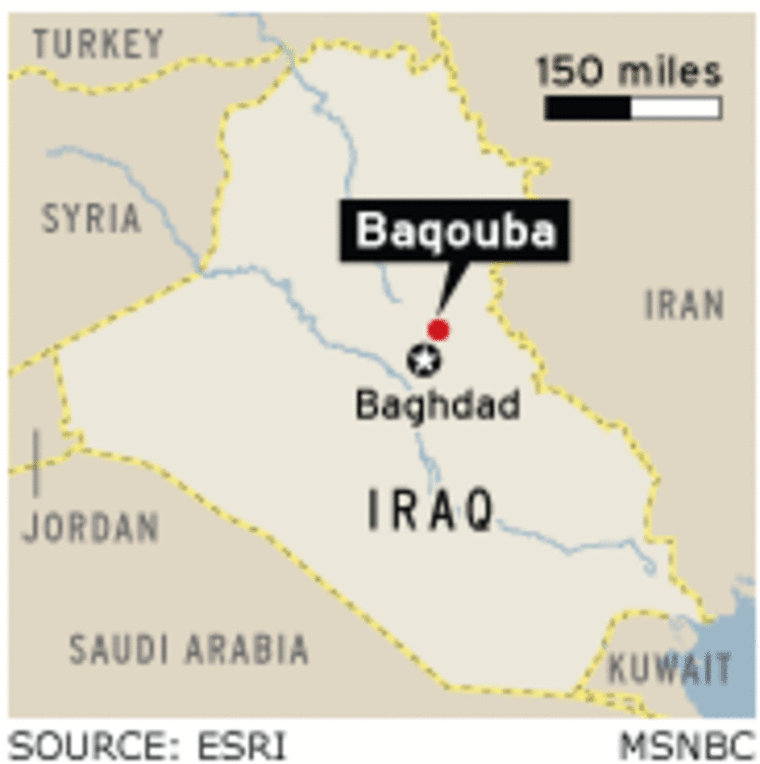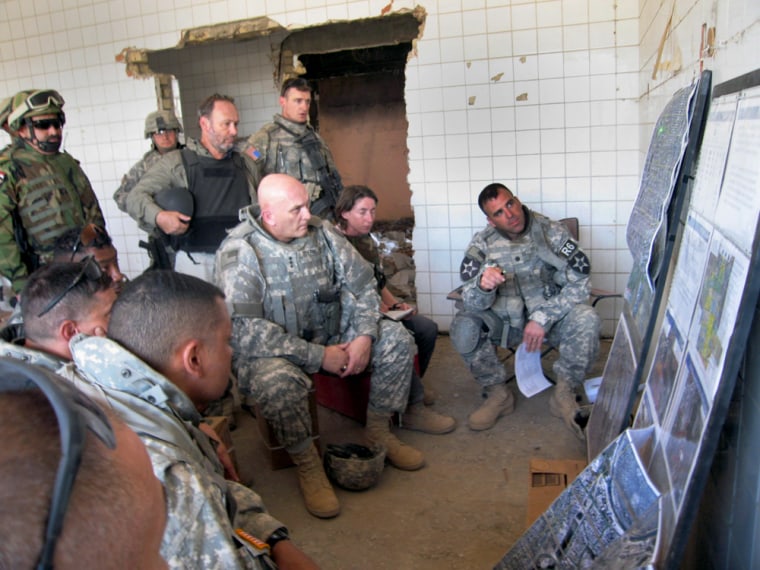American attack helicopters fired on al-Qaida militants trying to slip past an Iraqi checkpoint on Friday, the military said, killing 17 of them in the fourth day of an offensive to oust the fighters entrenched in this city an hour’s drive north of Baghdad.
More than three-quarters of the city’s al-Qaida leadership fled before the Americans moved in to Baqouba this week, U.S. officials said Friday, but not before drone planes spotted fighters planting dozens of roadside bombs on the main highway into the city, capital of volatile and extremely dangerous Diyala province.
Brig. Gen. Mick Bednarek, assistant commander for operations with the 25th Infantry Division, estimated that several hundred low-level al-Qaida fighters remain.
“They’re clearly in hiding, no question about it. But they’re a hardline group of fighters who have no intention of leaving, and they want to kill as many coalition and Iraqi security forces as they possibly can,” Bednarek said.
Separately, the U.S. military reported another American soldier killed, raising to at least 16 the U.S. death toll over the past three days.
Lt. Gen. Raymond Odierno, the top day-to-day commander of U.S. forces in Iraq, said the U.S. may be able to reduce combat forces in Iraq by next spring, if Iraq’s own security forces continue to grow and improve.
Odierno did not predict any U.S. reductions but said it may be feasible by spring. There are currently 156,000 U.S. troops in Iraq.
“I think if everything goes the way it’s going now, there’s a potential that by the spring we will be able to reduce forces, and Iraq security forces could take over,” Odierno said. “It could happen sooner than that. I don’t know.”
Speaking to reporters at the Pentagon from his headquarters outside Baghdad, Odierno gave an update on the series of U.S. offensives that are under way around Baqouba and in areas south and west of the capital. He said U.S. and Iraqi troops have made important progress.
“We believe 80 percent of the upper level (al-Qaida) leaders fled, but we’ll find them,” Odierno said after meeting with battalion commanders. “Eighty percent of the lower level leaders are still here.”
Hospital taken from militants
On Thursday, operation battalion commanders met at a bombed-out hospital here to plot their next moves.

Soldiers spread maps across rubble and pulled up charred concrete blocks as stools inside the crumbling building. Controlled explosions of roadside bombs boomed in the distance. Soldiers laden down by body armor mopped sweat from their faces.
“It’s 24-7 for us here, and it’s probably the same for our adversary as well,” Bednarek said. “It’s house-to-house, block to block, street to street, sewer to sewer — and it’s also cars, vans — we’re searching every one of them.”
The al-Qaida leaders abandoned a field hospital, complete with oxygen tanks, heart defibrillators and other sophisticated medical equipment, said Col. Steve Townsend, commander of the 3rd Brigade, 2nd Infantry Division. They also left behind at least seven homes booby-trapped with trip wires, said Townsend, 47, from Griffin, Ga.
Drones took video
Days before the offensive, unmanned U.S. drones recorded video of insurgents digging trenches with back-hoes, said Maj. Robbie Parke, spokesman for the 3rd Brigade, 2nd Infantry Division that is doing most of the fighting in western Baqouba.
About 30 roadside bombs — known as improvised explosive devices or IEDs — were planted on Route Coyote, the U.S. code name for a main Baqouba thoroughfare, said Parke, 36, from Rapid City, S.D. “So they knew we were coming.”
Odierno, who was in charge of Baqouba as head of the 4th Infantry Division in 2003 and 2004, said he was shocked at how entrenched al-Qaida had become.
“This is not the Baqouba I knew, and we can’t let this happen again,” he said. Militant activity spiked in Baqouba in the summer of 2006, Odierno said. A U.S. airstrike killed al-Qaida in Iraq leader Abu Musab al-Zarqawi near Baqouba in June 2006, but by then the city was already a major base for his terror network.
Since last fall, the U.S. has kept a single brigade — 3rd Brigade, 1st Cavalry Division — in charge of all of Diyala province. It was enough to conduct sporadic attacks on al-Qaida, but not enough to hold the entire province, Odierno said.
He encouraged battalion commanders to come up with a plan to prevent al-Qaida’s return, after the major fighting is over. “It’s down the road, but it’s what you should be thinking about right now,” warning “the heavy fighting still might be ahead of you.”
'Like jelly in a sandwich'
By the time American units moved in to block the militants’ escape, many were already gone, Odierno said.
“It’s like jelly in a sandwich — it squirts when you squeeze it,” Parke said. “We’re fooling ourselves if we think we can hold them in.”
U.S. officials accuse al-Qaida of using car bombings and other violence to try to tip Iraq into full-scale sectarian civil war. A suicide truck bomb blamed on al-Qaida killed 87 people outside a Shiite mosque in Baghdad on Tuesday.
Bednarek said the major difference with this week's campaign around Baqouba, the capital of Diyala province, was a new Iraqi commitment to the effort.
“It’s different than Fallujah in the fall of ’04, because of the Iraqi commitment here. They’re side by side with us, and locals have finally realized here that al-Qaida has no future here,” Bednarek said.
The U.S. military has sought to seize the momentum against al-Qaida and other militants with the arrival in Iraq of some 30,000 additional troops. It has launched several large-scale operations.
But it has also faced a series of recent attacks on U.S. forces who are more vulnerable as they increasingly take to the streets and remote outposts, and the bombs appear to be growing more powerful. Some U.S. soldiers have reported a recent increase in the use of rocket-propelled grenades.
